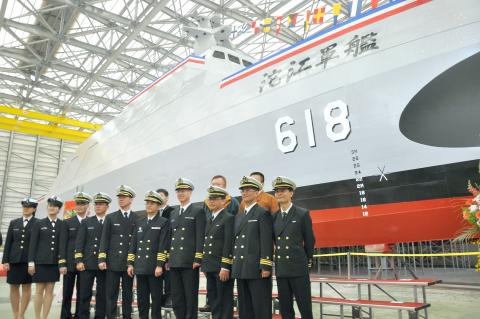The nation’s first stealth missile corvette was christened yesterday — a development that is expected to give the Republic of China Navy (ROCN) the capability to counter larger enemy warships.
The 500-tonne Tuo River (沱江) is the first of possibly 12 ships to be built locally under the Hsun Hai (迅海, Swift Sea) program.
The twin-hull corvette, described as a “carrier-killer” by local media, has a maximum speed of 38 knots (70kph) and a range of 2,000 nautical miles (3,704km). Its speed and low radar signature allows the corvette to get close to enemy targets, experts said.

Photo: CNA
The ship, 60.4m in length and 14m wide, carries a crew of 41. Its armaments include Hsiung Feng II and Hsiung Feng III anti-ship missiles.
The newly developed 500-tonne catamaran had been compared to China’s Type 022 Houbei fast attack missile ship, also a catamaran, due to similarities in their design.
When asked about the comparison yesterday, Republic of China Navy Admiral Chen Yung-kang (陳永康) said the Tuo River missile corvette was “infinitely better” than China’s Type 022.
According to Lung De Shipbuilding Co, the Tuo River is a modulated ship and welded together from 40 separately produced parts and sections.
It is also the first catamaran to be constructed from aluminum alloy.
The missile corvette’s range of 2,000 nautical miles would enable it to make a round-trip patrol from Taiwan to Itu Aba (Taiping Island, 太平島) in the South China Sea, the ROCN said.
The addition of the ship would help greatly in routine patrols to the South China Sea region, it added.
Chen also said the impetus in designing the ship was to produce a highly mobile missile corvette with large missile bays and greater range, and with strong striking and stealth capabilities.
“One of the reasons to emphasize building our own naval warships is to upgrade our overall naval defense capabilities, as well as strengthen the navy’s surface-to-surface combat abilities,” Chen said.
Yesterday’s christening ceremony was held indoors in Suao (蘇澳), Yilan County, and the ship is to undergo final tests and reviews before it is officially launched.
It is expected to be deployed in the first half of next year.
In 2011, the legislature approved a NT$24.98 billion (US$853.4 million) budget to fund the construction of between seven and 11 corvettes, but a fleet of 12 ships is expected to be built.

CHAOS: Iranians took to the streets playing celebratory music after reports of Khamenei’s death on Saturday, while mourners also gathered in Tehran yesterday Iranian Supreme Leader Ayatollah Ali Khamenei was killed in a major attack on Iran launched by Israel and the US, throwing the future of the Islamic republic into doubt and raising the risk of regional instability. Iranian state television and the state-run IRNA news agency announced the 86-year-old’s death early yesterday. US President Donald Trump said it gave Iranians their “greatest chance” to “take back” their country. The announcements came after a joint US and Israeli aerial bombardment that targeted Iranian military and governmental sites. Trump said the “heavy and pinpoint bombing” would continue through the week or as long

TRUST: The KMT said it respected the US’ timing and considerations, and hoped it would continue to honor its commitments to helping Taiwan bolster its defenses and deterrence US President Donald Trump is delaying a multibillion-dollar arms sale to Taiwan to ensure his visit to Beijing is successful, a New York Times report said. The weapons sales package has stalled in the US Department of State, the report said, citing US officials it did not identify. The White House has told agencies not to push forward ahead of Trump’s meeting with Chinese President Xi Jinping (習近平), it said. The two last month held a phone call to discuss trade and geopolitical flashpoints ahead of the summit. Xi raised the Taiwan issue and urged the US to handle arms sales to

BIG SPENDERS: Foreign investors bought the most Taiwan equities since 2005, signaling confidence that an AI boom would continue to benefit chipmakers Taiwan Semiconductor Manufacturing Co’s (TSMC, 台積電) market capitalization swelled to US$2 trillion for the first time following a 4.25 percent rally in its American depositary receipts (ADR) overnight, putting the world’s biggest contract chipmaker sixth on the list of the world’s biggest companies by market capitalization, just behind Amazon.com Inc. The site CompaniesMarketcap.com ranked TSMC ahead of Saudi Aramco and Meta Platforms Inc. The Taiwanese company’s ADRs on Tuesday surged to US$385.75 on the New York Stock Exchange, as strong demand for artificial intelligence (AI) applications led to chip supply constraints and boost revenue growth to record-breaking levels. Each TSMC ADR represents

State-run CPC Corp, Taiwan (CPC, 台灣中油) yesterday said that it had confirmed on Saturday night with its liquefied natural gas (LNG) and crude oil suppliers that shipments are proceeding as scheduled and that domestic supplies remain unaffected. The CPC yesterday announced the gasoline and diesel prices will rise by NT$0.2 and NT$0.4 per liter, respectively, starting Monday, citing Middle East tensions and blizzards in the eastern United States. CPC also iterated it has been reducing the proportion of crude oil imports from the Middle East and diversifying its supply sources in the past few years in response to geopolitical risks, expanding